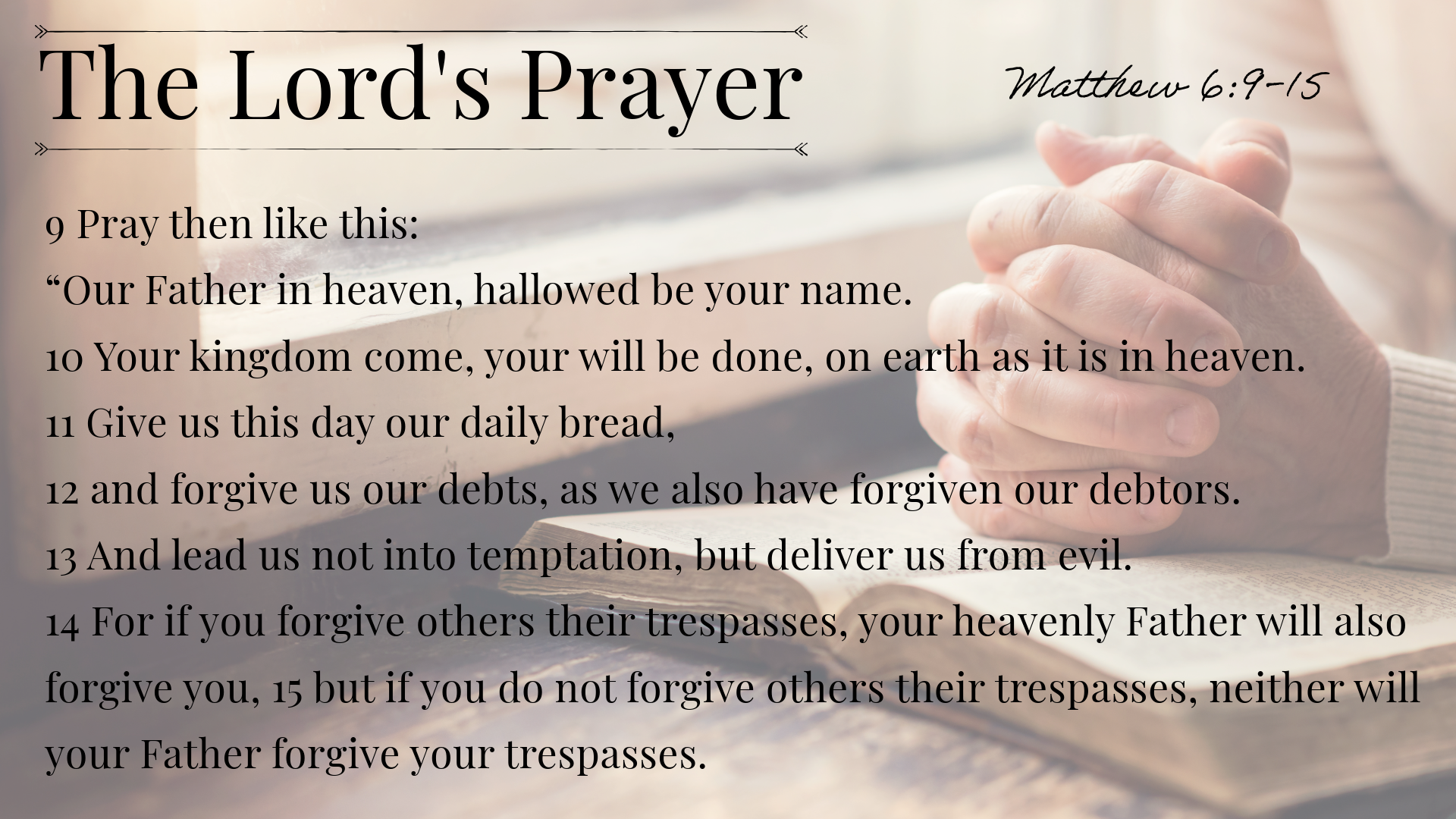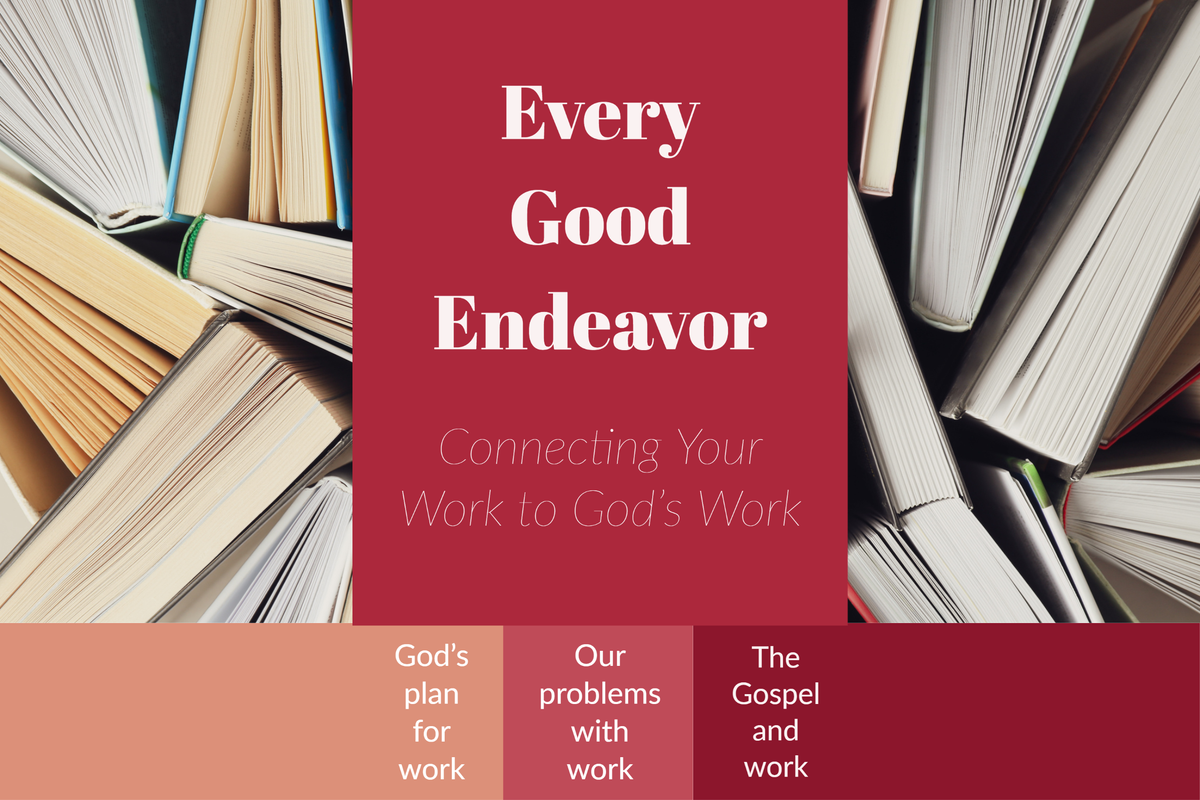Chances are you have probably heard the Lord's Prayer at some point in your life. Maybe you've even heard people recite it while they are praying. While our prayer life shouldn't just consist of reciting the Lord's Prayer that we find in Matthew 6:9-13, it is a good outline and reminder of the things we should be praying to God about. This is going to be our focus this month.

Prayer should be an important part of a Christian's life. I have actually talked about prayer before in a previous Cornerstone blog [link]. While it can seem easier to pray when times are hard and we want to ask God for help, we should still be praying when times are good. Sometimes I find it difficult to know what to pray and the Lord's Prayer is a helpful guideline for how we should pray.
We can break the prayer into 5 parts:
- Recognition
- Re-evaluation
- Requests
- Reconciliation
- Rescue
Recognition
"Our Father in heaven, hallowed be your name." - Matthew 6:9b
The Lord's Prayer starts with recognition of who God is. God is holy, he is in heaven, he is God. When you pray, are you taking time to recognize who God is and what he's done? Take time to acknowledge that God is bigger than… cancer, things at work, stressors in your life, etc. God is above all; nothing is too big for him. Coming to God in this way requires taking a posture of humility before him. You must recognize his holiness.
Reevaluation
"Your kingdom come, your will be done, on earth as it is in heaven." - Matthew 6:10
After recognizing who God is, we must reevaluate what he desires. It can be easy to be caught up in your "kingdom" whether that be your job, finances, or other things. This "kingdom" that you're trying to make is temporary. Come to God in prayer saying, "I know my 'kingdom' is temporary. Don't let me focus on that; instead let me focus on your Kingdom."
This again, requires a posture of humility. Prayer is not about trying to get God to line up with our interests; it is about getting us to line up with his interests (his will be done). Prayer can help us reorient our lives towards God's way before we actually go out and take action.
Requests
"Give us this day our daily bread," - Matthew 6:11
We've reached the part of the Lord's Prayer that might be the easiest part for people and what we tend to do the most when we pray – lay out our requests. This is especially easy to do when we are going through difficult times and want to ask God for different things. While it's not bad to come to God with our requests, I want us to go beyond just coming to God with a list of wants.
Pray this prayer as a prayer of dependence. The only way I'm going to make it and the only reason I have what I have is because of God. This prayer is again, requiring us to be humble. Even when you feel like you have everything you need and things are good, you can still use this part of the prayer as a prayer of gratitude.
Yes, you might have worked hard to earn the money you have to pay for things like food and the roof over your head, but who gave you the job? Who gave you the strength and ability to do it? God did! When you look at the food on your table, remember that it's only there because God took care of all the variables for you -- the job, the money, the resources, etc.
Oftentimes, even when you have everything you need, we will still go to God requesting more. While gratitude should lead to contentment, in our society, we are conditioned to always look for more. In the Lord's Prayer, Jesus is asking God for DAILY bread. What would you do if God only gave you your daily bread -- just what you needed for that day? If you're honest with yourself, you probably wouldn't handle it well. Most people wouldn't like only receiving what they need for each individual day; we would be stressing about if we'd have what we need for tomorrow. While we are surrounded by a society constantly looking for more, use this prayer as a chance to re-evaluate. How much do you really need? What can you do without?
Beyond the individual requests and gratitude for what you have, let's redefine the "us" we see in this prayer. Who is "us" that is mentioned in Jesus' prayer? Maybe we can go beyond just what we need. While we might have daily bread (literally and figuratively), there are people around the world that you can pray for that might not have daily bread.
So, when you pray, acknowledge your dependence on God, recognize and appreciate what he has given you, and then widen the circle of those on whose behalf you ask for bread.
Reconciliation
"and forgive us our debts, as we also have forgiven our debtors." - Matthew 6:12
God is a merciful God. We've all sinned and should go to God asking for forgiveness. Beyond that, we should ask for his help in forgiving those who have wronged us.
In the Sermon on the Mount book by Jeremy Bacon, we says forgiveness comes in two varieties: subjective and objective. Subjective forgiveness has to do with how you feel about the person who you need to forgive (the person who did the damage on you.) Sin has consequences; however, true forgiveness means letting go of your desires to see the one who sinned face those consequences. It can be very easy to want revenge and want them to suffer since they made you suffer, which is why we need God's help in forgiveness.
Forgiveness isn't going to be easy. And just like with other changes God requires of us, he doesn't expect perfection. Forgiveness is a process. It's about choosing to walk in the right direction and to walk with Jesus in it. It can be easy to tell someone that you forgive them, but do you truly mean it?
Rescue (from evil)
"And lead us not into temptation, but deliver us from evil." - Matthew 6:13
The Lord's Prayer ends with talking about evil. We can't ignore Satan and the evil in this world. We live in the "now but not yet"; we live in a fallen world and have to deal with the realities of living in a fallen world.
[Revelation 12:7-12]
Satan wants to hurt God; however, he can't do that. Therefore, he is going to do everything he can to hurt the people God loves. Satan wants us to hurt ourselves, and he uses temptation to do so. Do you have something you tend to struggle with? We can't have the attitude that we are just going to have the strength on our own to not act on the temptation. This part of the Lord's Prayer provides us with a daily reminder that we will encounter forces that are trying to pull us away from God. We must use this prayer as a way to keep us alert. What should we be on the lookout for every day? This will look different for everyone, but we must all be constantly staying alert. Satan will be waiting for us to let our guard down. Just like I mentioned earlier, the Lord's Prayer is an expression of humility. We do not have the strength on our own to fight the temptations that Satan throws at us.
Summary of the Lord's Prayer
If you're having a hard time knowing what to pray for, use this as a guideline:
- Recognize who God is (you can highlight some of his characteristics)
- Re-evaluate what he desires (instead of your own)
- Requests (both for yourself and others; take time to be grateful for what you have)
- Reconciliation with one another
- Rescue from evil
In Jesus' prayer, we can also summarize some of the advice he has (from Jeremy Bacon's Sermon on the Mount book):
- Take a posture of humility to God.
- Remember that the small stuff matters.
- Enter the Kingdom atmosphere of forgiveness.
- Keep turning our back on the world that is passing away.
In your current prayer life, do you tend to focus on one of these parts more than others? Going forward, which part of the Lord's Prayer do you need to work on implementing into your own prayer life?
Cornerstone Impact Update
Since January, we've been in part 1 of the book, Every Good Endeavor. The focus of part 1 has been God's design for work. April's blog wrapped up the first part of the book. If you missed any of the blogs in the series, you can find them here.

Eventide
How can investors ensure they own companies with good products and good practices? This is one of the questions that led to the founding of Eventide and still shapes their business today. The process they have is called Business 360®. Learn more about it in this video:
Inspire
When deciding to pursue faith-based investing, there is often a fear of making a mistake – investing in a company that isn't perfect. Where do you draw the line? Don't let this fear of perfectionism lead you to do nothing! Here's a blog from Inspire which goes into this more:







